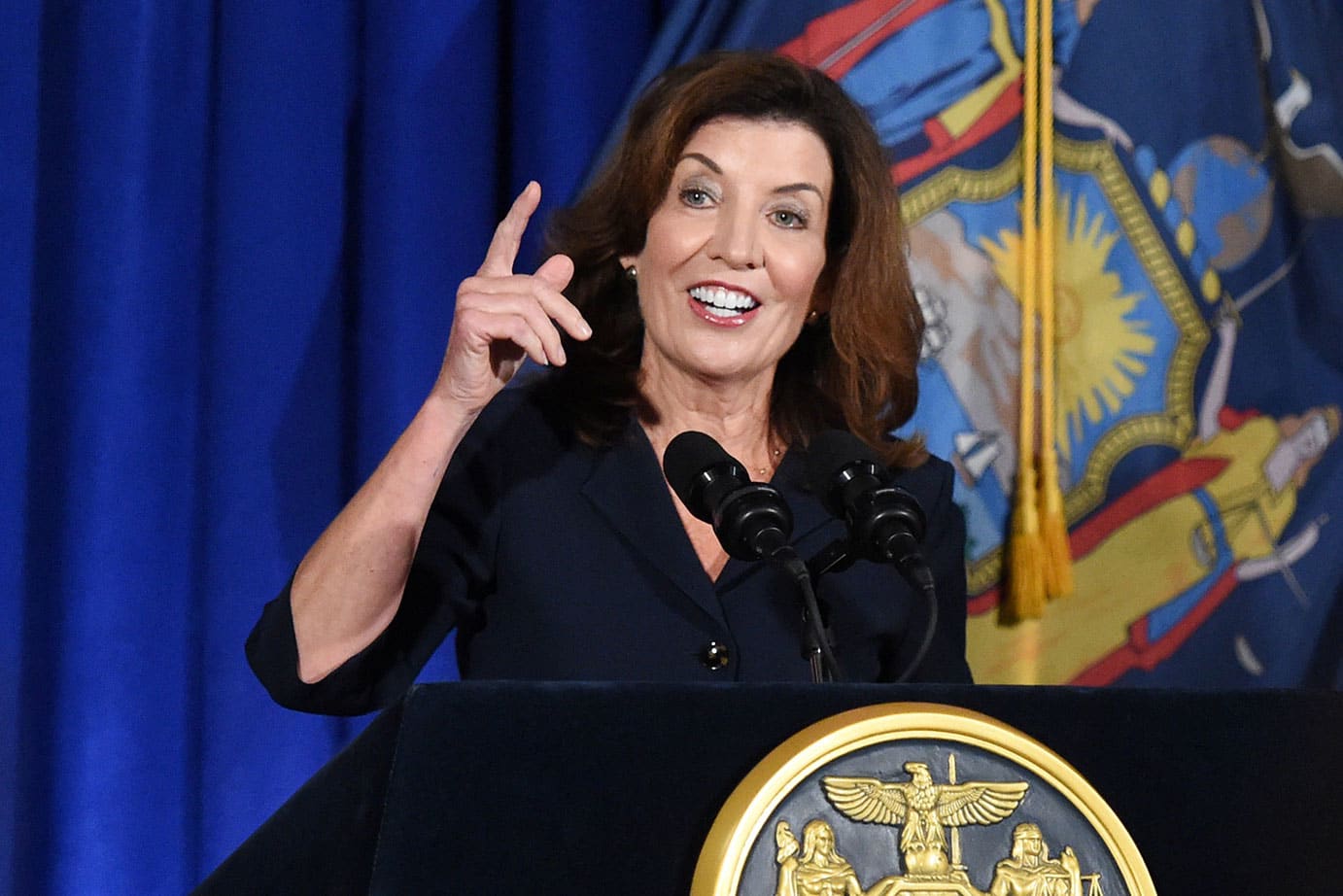What to Know
- The months-long impeachment probe into New York Gov. Andrew Cuomo will be suspended before the end of the month, the same day the embattled governor is expected to resign from his post
- Speaker Carl Heastie said in a statement Friday that the Assembly Judiciary Committee had heard from its lawyers that it can’t impeach and remove an elected official no longer in office
- Heastie’s statement released Friday didn’t say whether the committee would still publicize its findings
The months-long impeachment probe into New York Gov. Andrew Cuomo will be suspended before the end of the month, the same day the embattled governor is expected to resign from his post.
The threat of impeachment helped push the governor to resign but New Yorkers were left wondering in the days that followed whether the state Assembly would carry on with impeachment proceedings and try to bar him from future statewide office.
Speaker Carl Heastie said in a statement Friday that the Assembly Judiciary Committee had heard from its lawyers that it can’t impeach and remove an elected official no longer in office. Nevertheless, Heastie said, the evidence the committee had gathered “could likely have resulted in articles of impeachment had he not resigned.”
"After consulting with Chair Lavine and my majority colleagues, the Assembly will suspend its impeachment investigation upon the governor’s resignation taking effect on August 25," Heastie's statement said.
Heastie added that credible evidence of sexual harassment, the misuse of state resources for the governor's pandemic memoir, and misleading disclosures of nursing home data was found through the committee's investigation. Those files will be turned over to relevant investigatory authorities, the speaker said.
Get Tri-state area news delivered to your inbox. Sign up for NBC New York's News Headlines newsletter.
Cuomo faces ongoing probes from the state attorney general over his $5 million book deal and from state prosecutors, who are scrutinizing his handling of nursing home deaths data. The state’s ethics commissioners, who could levy fines against Cuomo, are also looking into similar issues.
Heastie also cited “active investigations” by county district attorneys in Manhattan, Albany, Westchester, Nassau and Oswego concerning incidents of alleged sexual harassment by Cuomo.
Since March, outside lawyers have been helping the committee conduct a wide-ranging investigation on whether there were grounds to impeach Cuomo, a Democrat. The announcement came on a day the Assembly had initially set as a deadline for Cuomo’s legal team to respond with any additional evidence refuting the allegations against him.
The first woman to publicly accuse Cuomo of misconduct, Lindsey Boylan, called the Assembly leadership’s decision to call off its separate investigation “an unjust cop out.”
“The public deserves to know the extent of the Governor’s misdeeds and possible crimes. His victims deserve justice and to know he will not be able harm others,” she wrote.
Some Judiciary committee members, including Democrats Phil Steck and Kenneth Braunstein, said Friday morning that they wanted the committee to at least release a report of their findings to the public.
Heastie’s statement released Friday didn’t say whether the committee would still publicize its findings.
All six Republicans and eight out of 14 Democrats on the committee said the Assembly should release such a report to the public, according to their public statements and interviews with The Associated Press. The remaining Democrats didn’t immediately respond to requests for comment.
Assemblymember David Weprin, a Democrat on the committee, said Friday an impeachment trial would have been a “tremendous waste of government resources.”
Heastie said earlier this week that the Assembly probe has already cost the state “millions,” but didn’t provide AP with an estimate.
Meanwhile, Republicans and several Democrats objected to the end of the Legislature’s probe. Assembly Minority Leader Will Barclay called it “a massive disservice to the goals of transparency and accountability.”
Assemblymember Tom Abinanti, a Westchester Democrat on the committee, said he objected to the decision, calling it “premature.”
“The governor has not even left office,” he said. “The committee should continue to meet and issue a public report to the people on the extensive investigation that the committee and its attorneys have conducted to date.”
Some legal and political experts had said that while people still may be interested in a process that holds Cuomo accountable, it is unclear whether lawmakers have the legal authority to impeach him on his way out the door.
“I’m not sure what the purpose of impeachment is. Impeachment is to remove him from office,” said Bennett Gershman, a law professor at Pace University. “He’s got to be impeached and then convicted by the Senate, and that’s a lot of work, a lot of hours. You'd think that these New York state representatives have better things to do than sit in judgment of a governor who’s already resigned.”
Although he has apologized for some of his behavior with women, Cuomo has denied any wrongdoing.
The possibility of a lightning-round effort to impeach Cuomo before he leaves now appears closed. The state Assembly's Judiciary Committee — the first stop for any impeachment matter — had been exploring whether there are grounds to impeach him since March.
Lt. Gov. Kathy Hochul, who will succeed Cuomo, declined to weigh in on the matter during a press conference Wednesday.
The end result — Cuomo out of office — is already a certainty, said Assembly Judiciary Committee Chair Charles Lavine, a Democrat.
“Impeachment itself is going to be moot. It’s not going to be meaningful,” Lavine said, unless to "prohibit him from ever again occupying statewide office.”
The state Legislature — both chambers are controlled by Democrats — would have had to muster the political will to quickly move forward with impeachment hearings, Gershman said, and would only do so as a punitive act to bar Cuomo from again seeking state office and possibly strip him of the perks afforded to elected officials who leave under normal circumstances.
“I think that scenario is incredibly unlikely,” said Ross Garber, an attorney who has represented four recent U.S. governors facing impeachment proceedings in their respective states.
His reading of state law is that a person must be in office at the time of impeachment, citing discussions in 1853 by the Assembly Judiciary Committee.
But that interpretation has never been tested. Only once before has a New York governor been impeached. In 1913, during the state’s notorious Tammany Hall era, Gov. William Sulzer was impeached — just 10 months after being sworn in.
It would take a simple majority of the Assembly to advance articles of impeachment to the High Court of Impeachment, which comprises members of the Senate and the state's highest court. To convict, two-thirds of the impeachment court must agree.
But the state constitution doesn't spell out much else, including the grounds for impeachment.
“Now the guy’s resigned and you want to impeach him, and you have to define his offenses as impeachable to do it, and that has a precedential consequence,” said Gerald Benjamin, a longtime scholar and expert on New York state government. “Are you defining only those things he did as impeachable, or are you defining all impeachable things, one of which is what he did?”
He agreed that it’s unclear if lawmakers can impeach a governor who’s resigned.
“There’s very little in the Constitution about impeachment, and the language is really quite vague,” added Richard Rifkin, who has worked in state government for 40 years, including in the attorney general’s office and as a special counsel to former Gov. Eliot Spitzer.
“There really isn’t any definitive precedent to say that you may or may not continue with the impeachment after the removal,” Rifkin said. “If you spoke to a number of lawyers, you could very well get different answers, and nobody would be wrong.”
Six Republican members of the Assembly’s Judiciary Committee said in a statement that they wanted the body's impeachment investigation to continue.
“The people of the state of New York deserve a full, public disclosure of the information obtained during our search for the truth," they said.
The director of the Working Families Party, an influential progressive group that has feuded with Cuomo, also called for the impeachment process to continue.
“Resignation is not accountability, and we urge the Legislature to continue with impeachment proceedings so that Andrew Cuomo is never again elevated to a position of power,” party director Sochie Nnaemeka said.
Trump's second impeachment proceeded in near-lightning speed, just a week after the Jan. 6 insurrection at the U.S. Capitol that triggered it. A month later, three weeks after Trump left office, Democrats in the U.S. Senate failed to muster the requisite votes to convict him.
There doesn't seem to be the same kind of political urgency with Cuomo.
“The pressure has been for Cuomo to resign from the beginning, that was what everybody has been talking about from President Biden on down,” Gershman said.
As it stands, Cuomo would anyway have at least 30 days to mount a defense against any articles of impeachment — meaning the outcome wouldn't be known until long after he's left office.



